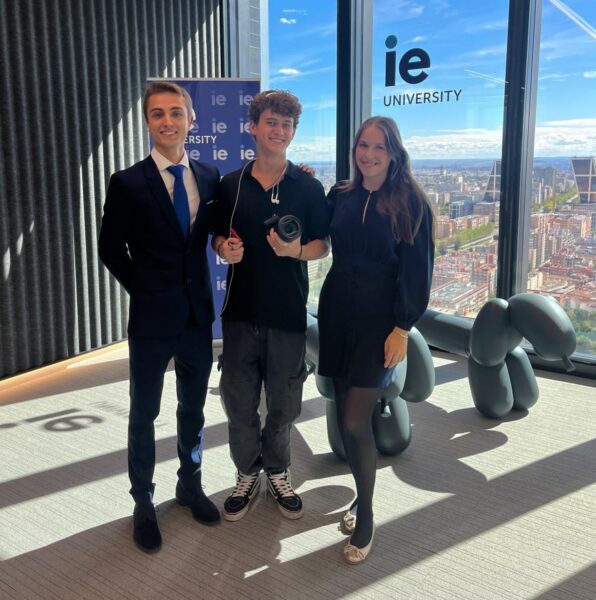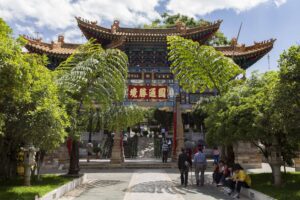How can we ensure the democratic participation of the youth? What is the relationship between education and human rights? In this interview, we explore such complex issues with Manuel Muñiz. This is the result of a collaboration between The Stork and Club de Madrid.
By Mariano Eduardo Abad Colino and Anna Shatalova.
Club de Madrid is the “largest forum of former democratic presidents and prime ministers who foster a democracy that delivers”. We are lucky to have one of its advisors at our university. Some weeks ago, we discussed some of the most important current affairs topics with him. Nevertheless, our experience with Manuel Muñiz goes beyond what was recorded.
Manuel Muñiz’s contributions go far beyond his role as provost. Besides being the provost of IE University, Manuel Muñiz was elected President of the Association of Professional Schools of International Affairs (APSIA), a non-profit educational organization representing 42 leading graduate schools and 37 affiliate programs specializing in international affairs worldwide. His academic achievements are equally remarkable, with examples in his career such as serving as Senior Associate in the Project on Europe and the Transatlantic Relationship at the Harvard Kennedy School’s Belfer Center for Science and International Affairs or directing the Transatlantic Relations Programme at the Harvard University’s Weatherhead Center of International Affairs, what sets Manuel apart is his active and impactful engagement in the geopolitical landscape. As students, we should be incredibly proud to have someone as capable as Manuel Muñiz as our university’s provost.
In his professional career, Manuel has held significant roles that have shaped Spain’s presence on the global stage. As Secretary of State for España Global within the Ministry of Foreign Affairs, European Union, and Cooperation, he supervised the drafting of the Foreign Action Strategy 2021–2024 and developed the National Strategy on Technology and Global Order, which laid the foundation for Spain’s Technological Diplomacy. He also served as Coordinator of the 2020 Spanish Presidency of the OECD. He was part of the President’s Expert Group on COVID-19, where he helped to design Spain’s De-escalation Strategy during the pandemic.
Many of the issues and strategies that International Relations and Political Science students study in their courses today came directly from Manuel’s proactive leadership. Yet, this leads to an important question: how did he get here? Was it his rigorous education and professionalism that granted him this level of success? Did he employ a ruthless “Harvey Specter” mindset, like in Suits, to achieve his goals? Curiously, what we discovered about Manuel Muñiz tells a very different story.
Table of Contents
The Power of Communication
The way Manuel Muñiz speaks about current events—with the right terms and eloquence—demonstrates how critical communication skills are for success. Words have the power to create direct impact, incite action, and inspire change. In today’s world, where social media and information overload dominate, having a voice that stands out is more important than ever. According to the Holmes Report, if ineffective communication costs businesses an average of $62.4 million a year, imagine what the cost could be for the global international order. Truly effective communication inspires us to foster mutual trust and share a vision of the world we would like to live in, thus creating a purpose for our political representatives and stimulating us to engage in our democracies.
Throughout the interview, Manuel Muñiz has not failed even once to uncover insights or perspectives that otherwise would have remained hidden. He managed to respond to each question with a curious mind and a global mindset. Moreover, as Manuel would answer, he always expressed genuine concern for the well-being of our democracies and the trajectory of the world. Changing the world requires knowing the right words to do it. It also demands being surrounded by people who inspire us to make the world a better place.
The Importance of Family
Most readers would agree that family is one of the most essential things in life, arguably the most important. Family will always be there when things do not turn out as planned. Their support inspires our success, directly or indirectly.
The very first day we got into Manuel’s office, what struck us the most was something we had not previously thought of: Manuel’s office was filled with personal touches, like photos and drawings from his children. Family warms you when you are cold, and it is hard to imagine Manuel being the same person without that foundation of love and support. It was a place of connection.
Leadership Through Connection
The provost’s team at IE University reflects Manuel’s character—each member is warm and approachable. One good example would be Nicolás Pérez, our point of contact from Manuel’s team, and Aitziber Onaindia, from the provost’s team. From the very beginning, the team was extremely supportive. Their enthusiasm and willingness to help made the process much easier for us. This shows how true success in leadership is not just about being a great manager; it is about being a people person who fosters genuine connections with others.
In a world where the norm to achieve success has become to leave emotions aside, sacrifice family time and work beyond measure, Manuel has redefined the path to success. Despite his tight schedule, Manuel willingly gave us a part of his time; he took the time to consider our crazy idea. His success, unlike others, does not separate him from the rest. On the contrary, it makes him get even closer to people, making everyone feel comfortable around him, even when discussing the hardest topics. This sets apart a successful person from a genuinely great one.

The Interview’s Key Themes: Multipolarism, Ukraine, Civil Society
In our conversation, we explored the interconnectedness of multipolarism, the war in Ukraine, and the lack of civil society engagement. We discussed how governments and private companies could play a role in incentivizing this engagement. Since the interview’s publication, recent developments have already been increasingly worrying. We have witnessed Russia’s launch of a hypersonic ballistic missile targeting the city of Dnipro in Ukraine, the first time such a weapon was used in any war known to human history, the issuance of arrest warrants by the ICC (International Criminal Court) for both the leader of Hamas and the Prime Minister of Israel along with the former defense ministry, deadly floods in Valencia, escalating violence in Africa with the recent gunfire in the capital of South Sudan, all while Putin gifts brown bears and lions to North Korea. More than ever, these events underscore the urgent need for multilateral cooperation—not only among governments and institutions but also across sectors, including civic engagement. The private sector must work and cooperate with the government for the common goal of protecting our democracy and our rights. At the same time, we, as citizens, must take an active stand to uphold democratic values.
Our team is working towards advancing these values. We are taking the first steps by working on bringing more Conversations for Change to better understand and develop solutions to the pressing issues facing modern democracies. We aim to inspire cooperation, resilience, and collective action in the face of global uncertainty.



